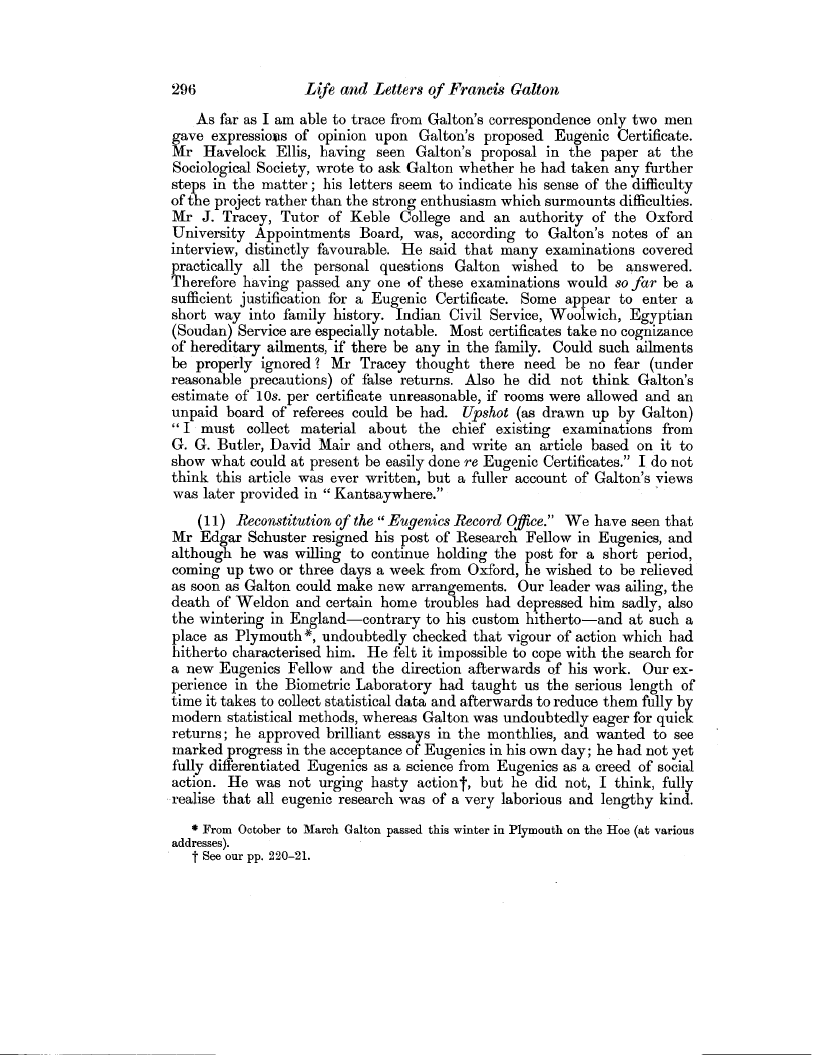| ||||||

OCR Rendition - approximate
296 Life and Letters of Francis Galton As far as I am able to trace from Galton's correspondence only two men gave expressiovs of opinion upon Galton's proposed Eugenic Certificate. Mr Havelock Ellis, having seen Galton's proposal in the paper at the Sociological Society, wrote to ask Galton whether he had taken any further steps in the matter ; his letters seem to indicate his sense of the difficulty of the project rather than the strong enthusiasm which surmounts difficulties. Mr J. Tracey, Tutor of Keble College and an authority of the Oxford University Appointments Board, was, according to Galton's notes of an interview, distinctly favourable. He said that many examinations covered practically all the personal questions Galton wished to be answered. Therefore having passed any one of these examinations would so far be a sufficient justification for a Eugenic Certificate. Some appear to enter a short way into family history. Indian Civil Service, Woolwich, Egyptian (Soudan) Service are especially notable. Most certificates take no cognizance of hereditary ailments, if there be any in the family. Could such ailments be properly ignored ? Mr Tracey thought there need be no fear (under reasonable precautions) of false returns. Also he did not think Galton's estimate of 10s. per certificate unreasonable, if rooms were allowed and an unpaid board of referees could be had. Upshot (as drawn up by Galton) " I must collect material about the chief existing examinations from G. G. Butler, David Mair and others, and write an article based on it to show what could at present be easily done re Eugenic Certificates." I do not think this article was ever written, but a fuller account of Galton's views was later provided in " Kantsaywhere." (11) Reconstitution of the "Eugenics Record Office." We have seen that Mr Edgar Schuster resigned his post of Research Fellow in Eugenics, and although he was willing to continue holding the post for a short period, coming up two or three days a week from Oxford, he wished to be relieved as soon as Galton could make new arrangements. Our leader was ailing, the death of Weldon and certain home troubles had depressed him sadly, also the wintering in England-contrary to his custom hitherto-and at such a place as Plymouth'*, undoubtedly checked that vigour of action which had hitherto characterised him. He felt it impossible to cope with the search for a new Eugenics Fellow and the direction afterwards of his work. Our experience in the Biometric Laboratory had taught us the serious length of time it takes to collect statistical data and afterwards to reduce them fully by modern statistical methods, whereas Galton was undoubtedly eager for quick returns ; he approved brilliant essays in the monthlies, and wanted to see marked progress in the acceptance of Eugenics in his own day; he had not yet fully differentiated Eugenics as a science from Eugenics as a creed of social action. He was not urging hasty actiont, but he did not, I think, fully realise that all eugenic research was of a very laborious and lengthy kind. * From October to March Galton passed this winter in Plymouth on the Hoe (at various addresses). 1' See our pp. 220-21.
|